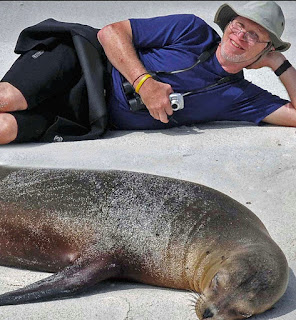 |
| Gain a deeper understanding of plant parts and their roles in "Basic Botany." Photo by Bill Snead. |
Motten is a distinguished associate professor emeritus in Duke's Department of Biology, and his passion and engaging way of teaching also made him a quick favorite among Duke Gardens instructors. You'll see why if you take his class. In the meantime, Motten offered some insights about himself and his love for plants in the following email exchange from 2016:
 |
| Alec poses with a beautiful friend. |
I earned my Ph.D. in zoology at Duke in 1982 and received undergraduate degrees in botany from UNC-Chapel Hill in 1970 and in zoology from the University of Washington in Seattle in 1976. I've always straddled the line between traditional botanist and zoologist designations and consider myself an equal-opportunity natural historian.
My primary responsibility at Duke has been teaching undergraduates an array of courses, including introductory biology, organismal diversity, botany, ecology, and genetics and evolution. I've also taught writing for first-year students and senior biology majors. My research interests are in evolutionary biology, pollination ecology and plant reproductive biology.
For my doctoral dissertation I studied plant-pollinator interactions in the spring wildflower community of Duke Forest. I still consider March and April my favorite time to be in the woods, and I like to lead spring wildflower hikes to local natural areas.
In my spare time, I enjoy hiking, camping and canoeing. During travels in the U.S. and abroad, I look forward to opportunities to learn the local flora and fauna and indulge my interest in wildlife and nature photography.
 |
| Learn how plants manage water in response to the environment. Photo by Orla Swift. |
Students in the class will get a whirlwind tour of basic plant biology and learn how plants are put together, how they function, grow and reproduce, and how they interact in different ways with animals. Extensive, colorful handouts will be provided to help students follow along with the many different topics we'll cover. I'll also bring in live specimens and lots of demonstration materials for hands-on activities and student personal observations.
Although any science class necessarily includes a certain amount of jargon, I'll keep that to a minimum and make sure to explain technical terms in language accessible to a non-specialist. My experience is that folks taking this class all have some interest in plants, often from a gardening or environmental conservation perspective, and my hope is to expand on that interest by helping students make connections with aspects of plant biology they are less familiar with. Plants are often taken for granted in our society -- they can be the unnoticed "wallpaper" of our world -- and I'd like to provide a deeper appreciation of just how amazing plant biology can be.
 |
| Learn how the structures of plants attract specific pollinators. Photo by Annabel Renwick. |
In a time when much of academia is caught up in either increasingly narrowly focused topics or trendy multi/inter/cross-disciplinary studies, it is refreshing to teach a rather more traditional subject and help students delve into it with fresh eyes and new curiosity. I always look forward to this opportunity to share my enthusiasm for botany with willing, interested students in a largely informal, relaxed setting -- no quizzes or papers! And, without a set curriculum to cover for an exam, I like being able to go off on botanically oriented tangents as student interests and unexpected opportunities may lead. The students and I always learn something new!
Motten's class meets for four Thursday night sessions, from Feb. 15 to March 8, from 6-9 p.m. If you are interested in learning more, please check out the class description for "Basic Botany and Plant Growth" on our website. To register, please call 919-668-1707 or send us an email. We look forward to seeing you!
This article is adapted from a 2016 post by Sarah Leach Smith.